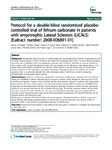Protocol for a double-blind randomised placebo-controlled trial of lithium carbonate in patients with amyotrophic Lateral Sclerosis (LiCALS) [Eudract number: 2008-006891-31]
| dc.contributor.author | Al-Chalabi, A | |
| dc.contributor.author | Shaw, PJ | |
| dc.contributor.author | Young, CA | |
| dc.contributor.author | Morrison, KE | |
| dc.contributor.author | Murphy, C | |
| dc.contributor.author | Thornhill, M | |
| dc.contributor.author | Kelly, J | |
| dc.contributor.author | Steen, IN | |
| dc.contributor.author | Leigh, PN | |
| dc.date.accessioned | 2020-10-01T07:20:40Z | |
| dc.date.available | 2020-10-01T07:20:40Z | |
| dc.date.issued | 2011-12 | |
| dc.identifier.issn | 1471-2377 | |
| dc.identifier.issn | 1471-2377 | |
| dc.identifier.other | 111 | |
| dc.identifier.uri | http://hdl.handle.net/10026.1/16454 | |
| dc.description.abstract |
BACKGROUND: Amyotrophic lateral sclerosis is a rapidly progressive neurodegenerative disorder characterised by loss of motor neurons leading to severe weakness and death from respiratory failure within 3-5 years. Riluzole prolongs survival in ALS. A published report has suggested a dramatic effect of lithium carbonate on survival. 44 patients were studied, with 16 randomly selected to take LiCO3 and riluzole and 28 allocated to take riluzole alone. In the group treated with lithium, no patients had died (i.e., 100% survival) at the end of the study (15 months from entry), compared to 71% surviving in the riluzole-only group. Although the trial can be criticised on several grounds, there is a substantial rationale from other laboratory studies that lithium is worth investigating therapeutically in amyotrophic lateral sclerosis. METHODS/DESIGN: LiCALS is a multi-centre double-blind randomised parallel group controlled trial of the efficacy, safety, and tolerability of lithium carbonate (LiCO3) at doses to achieve stable 'therapeutic' plasma levels (0.4-0.8 mmol/L), plus standard treatment, versus matched placebo plus standard treatment, in patients with amyotrophic lateral sclerosis. The study will be based in the UK, in partnership with the MND Association and DeNDRoN (the Dementias and Neurodegnerative Diseases Clinical Research Network). 220 patients will be recruited. All patients will be on the standard treatment for ALS of riluzole 100 mg daily. The primary outcome measure will be death from any cause at 18 months defined from the date of randomisation. Secondary outcome measures will be changes in three functional rating scales, the ALS Functional Rating Scale-Revised, The EuroQOL (EQ-5D), and the Hospital Anxiety and Depression Scale.Eligible patients will have El Escorial Possible, Laboratory-supported Probable, Probable or Definite amyotrophic lateral sclerosis with disease duration between 6 months and 36 months (inclusive), vital capacity ≥ 60% of predicted within 1 month prior to randomisation and age at least18 years. DISCUSSION: Patient recruitment began in June 2009 and the last patient is expected to complete the trial protocol in November 2011. TRIAL REGISTRATION: Current controlled trials ISRCTN83178718. | |
| dc.format.extent | 111- | |
| dc.format.medium | Electronic | |
| dc.language | en | |
| dc.language.iso | eng | |
| dc.publisher | Springer Science and Business Media LLC | |
| dc.subject | Adult | |
| dc.subject | Amyotrophic Lateral Sclerosis | |
| dc.subject | Clinical Protocols | |
| dc.subject | Double-Blind Method | |
| dc.subject | Drug Therapy, Combination | |
| dc.subject | Female | |
| dc.subject | Humans | |
| dc.subject | Lithium Carbonate | |
| dc.subject | Male | |
| dc.subject | Neuroprotective Agents | |
| dc.subject | Placebos | |
| dc.subject | Psychiatric Status Rating Scales | |
| dc.subject | Riluzole | |
| dc.subject | Severity of Illness Index | |
| dc.title | Protocol for a double-blind randomised placebo-controlled trial of lithium carbonate in patients with amyotrophic Lateral Sclerosis (LiCALS) [Eudract number: 2008-006891-31] | |
| dc.type | journal-article | |
| dc.type | Journal Article | |
| dc.type | Multicenter Study | |
| dc.type | Randomized Controlled Trial | |
| dc.type | Research Support, Non-U.S. Gov't | |
| plymouth.author-url | https://www.webofscience.com/api/gateway?GWVersion=2&SrcApp=PARTNER_APP&SrcAuth=LinksAMR&KeyUT=WOS:000295785300001&DestLinkType=FullRecord&DestApp=ALL_WOS&UsrCustomerID=11bb513d99f797142bcfeffcc58ea008 | |
| plymouth.issue | 1 | |
| plymouth.volume | 11 | |
| plymouth.publication-status | Published | |
| plymouth.journal | BMC Neurology | |
| dc.identifier.doi | 10.1186/1471-2377-11-111 | |
| plymouth.organisational-group | /Plymouth | |
| plymouth.organisational-group | /Plymouth/Faculty of Health | |
| plymouth.organisational-group | /Plymouth/Faculty of Health/Peninsula Medical School | |
| plymouth.organisational-group | /Plymouth/REF 2021 Researchers by UoA | |
| plymouth.organisational-group | /Plymouth/REF 2021 Researchers by UoA/UoA01 Clinical Medicine | |
| plymouth.organisational-group | /Plymouth/Research Groups | |
| plymouth.organisational-group | /Plymouth/Research Groups/Institute of Translational and Stratified Medicine (ITSMED) | |
| plymouth.organisational-group | /Plymouth/Research Groups/Institute of Translational and Stratified Medicine (ITSMED)/CBR | |
| plymouth.organisational-group | /Plymouth/Users by role | |
| plymouth.organisational-group | /Plymouth/Users by role/Academics | |
| plymouth.organisational-group | /Plymouth/Users by role/Researchers in ResearchFish submission | |
| dc.publisher.place | England | |
| dcterms.dateAccepted | 2011-09-21 | |
| dc.identifier.eissn | 1471-2377 | |
| dc.rights.embargoperiod | Not known | |
| rioxxterms.versionofrecord | 10.1186/1471-2377-11-111 | |
| rioxxterms.licenseref.uri | http://www.rioxx.net/licenses/all-rights-reserved | |
| rioxxterms.licenseref.startdate | 2011-09-21 | |
| rioxxterms.type | Journal Article/Review |


